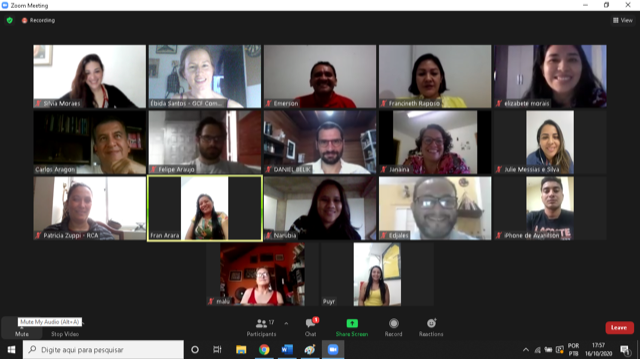Participatory diagnosis started to identify problems, trends, and solutions for the development of the indigenous economy in the post-COVID-19 Amazon scenario
Environmental management and development of the traditional economy in indigenous lands will be topics for analysis and discussion in the States of the Brazilian Legal Amazon. This effort will result in a participatory diagnosis that should identify problems, trends and mainly possible solutions to support environmental management and development of the indigenous economy in the post-pandemic period, specifically working on the territories occupied by these traditional populations.
On October 16th, the new consultants hired met virtually with indigenous leaders and representatives of the states of the legal Amazon, within the scope of the Regional Committee for Partnership with Indigenous Peoples and other Traditional Communities of the GCF Task Force in Brazil. The meeting allowed Committee members and regional indigenous leaders to share their perceptions and perspectives with consultants and to align strategies for their work.
The importance of considering the cultural and geographical specificities of traditional populations was emphasized throughout the meeting. Francineth dos Santos, Special Advisor to the Roraima Indian State Secretariat and the Macuxi People’s Leadership, recalled that “each indigenous people, even within the same region, has its specific demands,” and reinforced, “We count on the consultants’ expertise and we believe that we will have good results.”
In this sense, Puyr dos Santos Tembé, leader of the Tembé People and acting president of the Indigenous Peoples’ Federation of the State of Pará, highlighted that indigenous peoples build processes and make decisions based on dialogue and love on their movements.
“We are brothers, regardless of where we are or the differences we have. And, talking, we can solve any problem that may arise. The most important is that when it is necessary, we are together, united.” – Puyr dos Santos Tembé
The application of the study’s results in public policies was another aspect highlighted by the Coordinator of Planted Forests of Rondônia, Julie Messias. For her, it is important that studies serve as a subsidy for public policies and thus help to “consolidate spaces for dialogue with indigenous peoples.” The Committee’s President, Francisca Arara, added that the studies will also “serve as a basis for low-emission development policies.”
The supporting organizations emphasized that there were many impacts of COVID-19 on indigenous populations. Despite this, the work has continued based on the search for solutions. They also considered the importance of the Committee for the process of shared construction that the current context requires.
The Committee’s President, Francisca Arara, also stressed the importance of the three indigenous consultants among those selected in the national competitive process that was opened to carry out the studies. She pointed out that the result also represents the valorization of scientific knowledge acquired by indigenous populations.
The consultancies were made possible by cooperation between indigenous organizations, Member States of the GCF Task Force, the United Nations Development Program, and local indigenous organizations with the support of indigenous non-governmental organizations.

